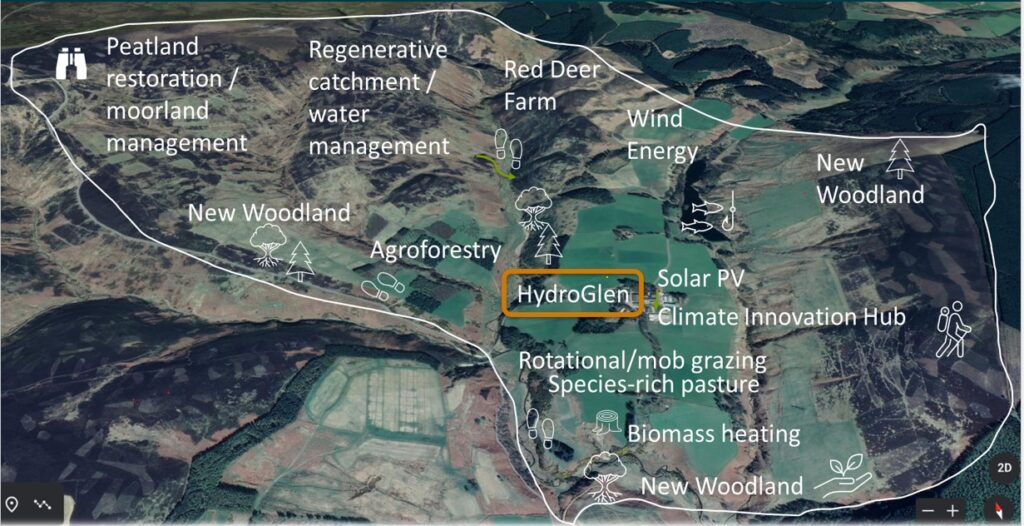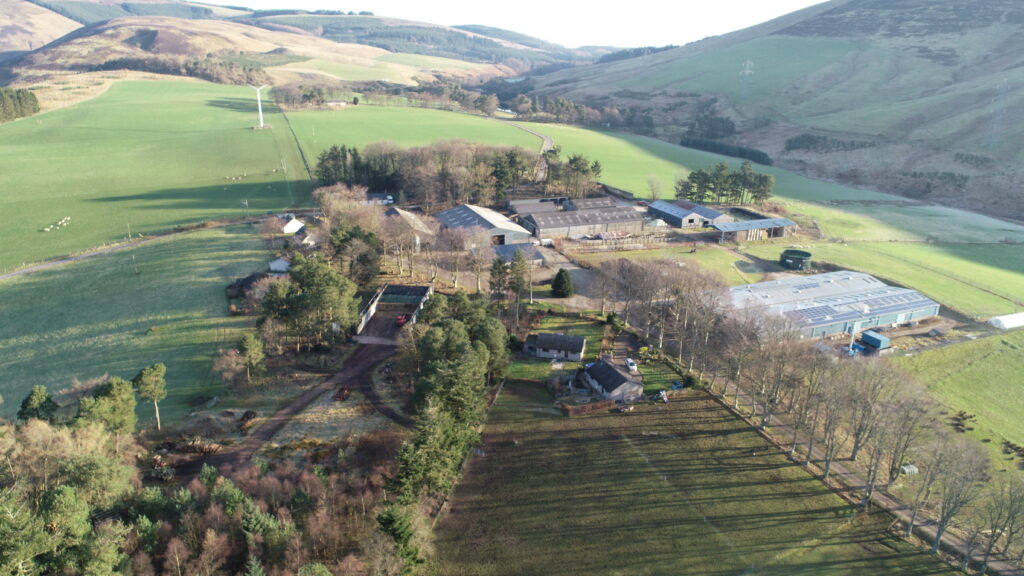HydroGlen
HydroGlen is a £6.2 million green hydrogen powered farming community pilot project in north east Scotland, funded by the Scottish Government’s Just Transition Fund in 2022, which provides a scalable and replicable concept for farming and other rural communities.
HydroGlen forms part of the James Hutton Institute’s Climate-Positive Farming Initiative located at the Glensaugh research farm and residential community.
About HydroGlen
A technical feasibility study was carried out in 2021 after JHI received a grant from the Scottish Government’s Community and Renewable Energy Scheme (CARES), which demonstrated technical and regulatory feasibility, utilising a combination of renewable electricity, on-site hydrogen production, compression, and storage.
This pilot project will provide a first-of-its-kind demonstrator and replicable model for green hydrogen-powered farming communities creating new jobs and protecting the long-term viability of rural areas in north east Scotland. By being a first adopter, north east Scotland’s expertise and businesses will be best placed to export know-how and technology to other regions to amplify job creation and knowledge development. The construction of HydroGlen will provide a practical demonstrator of the feasibility of hydrogen farms in Scotland and the UK, allowing farming communities and cooperatives to visit, acquire new knowledge and replicate, reducing their own reliance on grid energy, which will increase their resilience against the volatility of energy prices, potential energy outages or shortages. This in turn will be highly beneficial for food security in the UK.
Niamh Carr, HydroGlen Development Officer
HydroGlen will provide these communities the new knowledge required to switch from increasingly high levels of fuel poverty to become self-reliant, net-zero carbon energy producers and exporters, generating 100%+ of their electricity, heating and transport fuel energy requirements renewably.
HydroGlen 4 key goals:
- “Build ready” – Commercially available technologies: HydroGlen will utilise technical components that are readily available on within the market so that those who will replicate the HydroGlen model can do so without having to manufacture specific components.
- Hydrogen and Electric Vehicle combinations: HydroGlen, as part of its role as a demonstrator will showcase a mix of vehicle types, EV and H2 as renewable electricity and green hydrogen is being generated on site. This also provides Hydrogen vehicles, especially agri-vehicles which are still in the R&D stage of production an opportunity to be showcased onsite. This will provide learnings for other hydrogen power farms when replicating the HydroGlen model elsewhere in the UK.
- Replicability – both on and off grid: HydroGlen is a grid connected hydrogen system, but as this project is aiming to address energy security on farms and rural areas many of these locations are off grid. The HydroGlen project will be able to be replicated in these off grid, rural landscapes and will provide a solution to energy independence for their communities.
- Modular and scalable: The HydroGlen project will be able to be scaled up and down depending on the energy requirements for other farm sites and land sizes. For example, if at Glensaugh the energy usage increased we could add additional components with relative ease. For other locations that are replicating the “HydroGlen model”, they will be able to. For example, if the site had existing curtailed wind turbines, they could adjust our project model to fit their needs.
These objectives are critical to roll out similar HydroGlen hydrogen farms across Scotland, as the Scottish Government has large targets for Hydrogen production by 2035. The agricultural sector will be paramount in these “Hydrogen hubs” as Scottish Government reports that the agricultural land use sector contributes to 18% of Scotland’s greenhouse gas emissions (GHG).


Timeline of HydroGlen:
- Feasibility report: 2021
- Design Phase: 2022-2023
- Public Consultation: 04 Sept 2023
- Invitation to submit expressions of interest deadline: 22 Nov 2023
- Planning applications submitted: Dec 2023
- Dialogue stage with EPC bidders: Jan 2024 – Feb 2024
- Planning permission received for Wind Turbine application and Hydrogen Application from Aberdeenshire Council: April 2024
- Demolition: Nov 2024
- Selected Contractor Announced: Dec 2024
- Construction stage: Winter 2024 – Winter 2025
- Completion of project: Winter 2025
